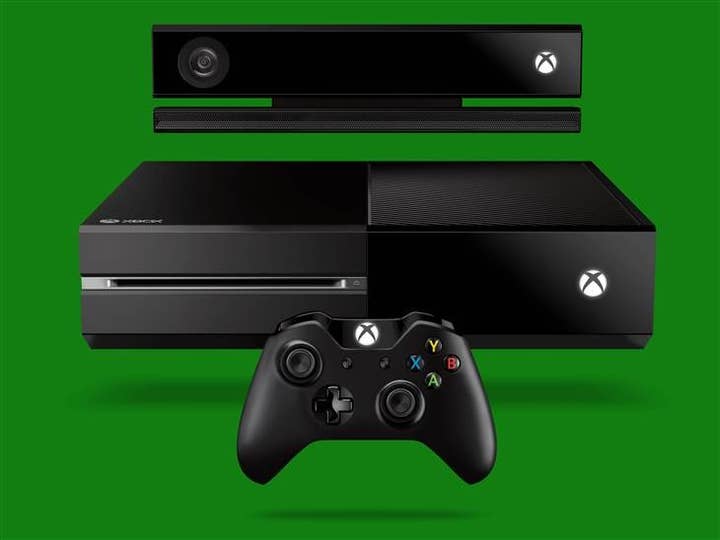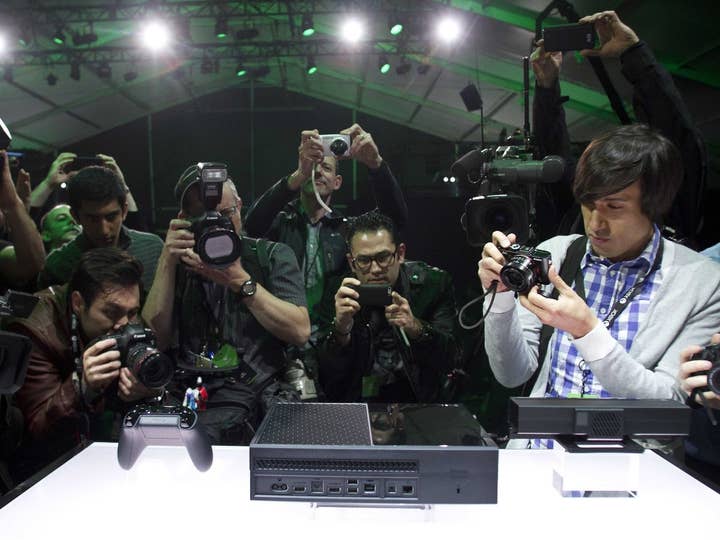Xbox One: "E3 is absolutely all about the games"
Last night's grand unveiling has caused confusion. Xbox UK marketing chief Harvey Eagle has some, but not all, of the answers
What a difference an evening makes. When I sat down to talk with Harvey Eagle at a hosted live-stream session yeterday, Xbox UK's marketing director seemed happy, relaxed. His countenance suggested that, but for a few buffering issues handling the feed from the official event in Seattle, everything had played out as expected. The plan had come off without a hitch.
I wonder what story his face would tell this morning. Confusion and disappointment reigns, on this site and many, many others, and it's all down to the games - new and used, on and off, backwards and forwards. Among the small but undeniably heavy handful of problems being vehemently debated right now, there are three that dominate the din: Xbox One's policy on used software, the extent to which the console requires an internet connection to function, and whether it really will just be a device for being distracted while you're trying to watch Star Trek.
"E3 is gaming, gaming, gaming. But we felt that there was another part, and we didn't want to wait until after E3 to start telling that story"
On the first matter, Eagle was as concise as it's possible to be. The "policies" by which the system will be governed are still being finalised, but the message was simple and definitive: "We are building the Xbox One to support the trading and re-selling of used games. We are working through the policies of how that will work right now, but we will not block used games."
Journalists all over the world have pressed the issue with whatever Microsoft executive to whom they have been granted access, and the resulting answers seem only to have exacerbated the sense of bewilderment. There's a good reason for this: Microsoft was ready to confirm that used games would work on Xbox One, but no more than that, and a simple idea explained ten different ways only becomes more opaque with each new perspective. The press wants to know the precise details, and that's the one thing that Microsoft isn't willing to part with just yet. Until then, statements like the one Eagle gave yesterday may as well not exist.
On the Xbox One's rumoured always-on requirement, Eagle was similarly unequivocal, even going so far as to concede that he felt the issue "wasn't re-addressed" by Don Mattrick and his cohorts in Seattle: "The answer to that question is no, you do not require an always on connection to use Xbox One.
"The system is clearly designed to be connected to the internet, and hopefully from what you've just seen you will realise some of the benefits of that point. But if your internet drops, you will still be able to play games, you will still be able to watch Blu-ray movies, you will still be able to watch live TV."

In both regards, the Xbox One is near identical to the PlayStation 4. Both systems are confirmed to support used games, though neither Sony nor Microsoft has detailed the processes behind their new policies. And both systems' features and services are designed to work with the internet and the cloud at the most fundamental level, though neither will become a lifeless brick if your connection drops. The question may not be whether the Xbox One requires an internet connection to function, but whether anyone without the ability to access the internet for even a few minutes will have much use for what it actually offers.
And so to the games, which many feel to be the great absentee from a conference in which the words "TV" and "television" were used so many times they comprise a good chunk of a a YouTube video that lasts for nearly two minutes. Microsoft made it clear in the run-up to the event that the unveiling of the Xbox One would be in two parts, and Eagle reiterated that to the gathered audience of journalists both before and after the stream. This, I suspect, was the message Eagle was most concerned about delivering, and last night, at least, he seemed satisfied that Microsoft had done its job.
"Seeing is believing. I understand that people want to see the games, play the games and then make a judgement. That's fair and reasonable, and we're not so naïve to think otherwise"
"E3 is absolutely all about the games," he said. "E3 is gaming, gaming, gaming. We've been very clear about that internally in our planning.
"But we felt that there was another part, and we didn't want to wait until after E3 to start telling that story. So that's why we went with the plan tonight: to come out of the gate with the overall vision for the box, an all-in-one device with games, TV and entertainment. We didn't want to forget games entirely tonight, because then there's the risk that people think we're forgetting them, and that couldn't be further from the truth. But we tried to be clear that E3 completes the story, and that's where you'll see the games."
It should be noted that games did play a role in last night's event, though principally in forms that we understand all too well (Call of Duty, EA Sports, Forza), glimpses too brief to truly satisfy (Remedy's intriguing multimedia project), and the service level of achievements, multiplayer and seamless switching to other system functions. All of these things will certainly be important to the Xbox One's overall proposition, but any lingering sense of deflation is largely down to Microsoft's decision to tell its "two-part story" the wrong way round.
The Xbox One will have 15 exclusive games, 8 of which are new IP, in its first year, but we will have to wait until E3 to learn more. As with the used games policy, for much of the press that lack of hard details is tantamount to to a retreat. The first word Microsoft chose to say was "TV," and that is all that many people heard.
"Seeing is believing," Eagle conceded. "I understand that people want to see the games, play the games and then make a judgement. That's fair and reasonable, and we're not so naïve to think otherwise. Given the structure of the unveil tonight, we wanted to make sure that we showed real, in-game content, but the proof for many will be when they have a chance to play those games. And that's fine.
"I hope people weren't confused about games still being absolutely critical and fundamental to us. We are a gaming machine that is designed deliver the best experiences in gaming. What we want to try and do is more than that, and we have a box that can do more than that without compromising being the best games console out there.
"Ultimately, we have an ambition to grow the market, and we believe that in order to do that and bring new people in we need to deliver great gaming. But also if we can deliver great entertainment and great TV experiences all in one box, then we think we have an opportunity to appeal to even more people."

This point may prove to be crucial. Right now, the vast majority of the negative reaction to Xbox One is around problems that may not prove to be problems at all. Microsoft's track record for launching consumer products is hardly spotless, but it has taken enough knocks to have learned a thing or two and, with the Xbox One, it has never been more important that it gets every detail just right.
Whatever Microsoft has planned regarding used games may well be a self-serving disaster, but it may also be a fundamental rethink of the way this kind of transaction is carried out, that puts more money in the pockets of developers and publishers. The system's online requirements may interrupt the gaming habits of a huge swathe of loyal customers, but, like the PlayStation 4, it may be about allowing the Xbox One to be more than just an Xbox 360 with better graphics to those with bandwidth enough to make use of its full range of services. And the lack of game announcements may be a worrying signal that Microsoft no longer 'cares' about the sort of products on which the entire Xbox business was built, or it might just be a sign that it regards E3 as a more suitable venue for game announcements than for discussion of an all-in-one entertainment proposition.
"You can put any kind of functionality into a box - we could have put a toaster with it if we wanted - but you need the content to light that up"
In each case, the negative possibilities were publicly scrutinised for months before Don Mattrick took to the stage last night, and Microsoft evidently didn't do enough to pacify its doubters. For Eagle, though, the sort of experiences Microsoft showcased are exactly what the console market needs to continue growing. People may express concern that there won't be enough games, but from my time with Eagle I get the impression that the need to provide that sort of content - and in great volumes - is a given. Games are the one thing that every single competing console is guaranteed to offer their consumers, and Microsoft intends to be a fierce rival in that regard while also delivering a level of service and the sort of content that will put it head and shoulders above its classic rivals, and into whole new markets.
"You can put any kind of functionality into a box - we could have put a toaster with it if we wanted - but you need the content to light that up," Eagle said. "This is a great time for the industry, and there's growth ahead, but what fuels the growth is innovative content. You don't achieve growth through functionality, you get it through killer content.
"There are game consoles with some level of entertainment functionality, and there are entertainment boxes that offer some sort of gaming, but there hasn't been any device that does both of those things brilliantly. This is the first device that will deliver on that premise, and that's where we'll be different from some of the other competition.
"You've seen what we have to offer. We are trying to deliver incredible experiences in the living room, and we believe that we have a box that does a great job of gaming, TV and entertainment.
"You can decide who that puts us up against."

